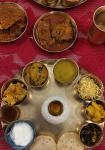Connolly, the U.S. triple jump champion, had arrived in Athens for the first of the modern Games in 1896 only to discover to his dismay that he was due to compete the following day. He and his team mates had not realised that the Greek calendar differed from the American.
Following the rules of the time, Connolly hopped twice and jumped once to win the title with 13.71 metres and give his chosen event its brief day in the sun.
Field events have always been the poor relations of the Olympic athletics programme, serving mostly as a backdrop to the glamorous track races.
Paramount among these has been the 100 metres, won by American Thomas Burke in 1896 and dominated by the United States since.
Discounting Archie Hahn, who won in St Louis in 1904 and again at the interim Athens Olympics of 1906, only Carl Lewis has retained the 100 metres title. Lewis in fact finished second to Ben Johnson in 1988 but was awarded the gold medal after the Canadian tested positive for a steroid.
Lewis competed in four Olympics, winning nine gold medals including four at the 1984 Los Angeles Games. His haul in Los Angeles, comprising the 100, 200, long jump and 4x100 metres relay, was identical to Jesse Owens's at the 1936 Berlin Games.
Both men were the dominant sprinters of their time, although their paths diverged sharply after their respective triumphs.
Owens, the son of sharecroppers, was reduced to racing horses for a living. Lewis, who came from a middle class background, was able to take full advantage of the new professional era.
MARATHON MYSTIQUE
At the other end of the scale, the marathon has enjoyed a mystique of its own since the 1986 Games when Spiridon Louis triumphed for the host nation.
The most memorable race over the now standard distance of 42.195 kms took place at the 1908 London Games, when Italian Dorando Pietri was disqualified after he was assisted across the line following a collapse on the track.
In 1960 Ethiopian Abebe Bikila ushered in a new era of African long-distance supremacy when he won the first of his two titles in Rome.
Between these two extremes, the 1,500 metres has provided the perfect balance of speed, stamina and intellect.
In 1936 Jack Lovelock became the first of three New Zealanders to win the title by defeating the American world record holder for the mile Glenn Cunningham and defending champion Luigi Beccali.
Lovelock started his final sprint 300 metres from the tape to take a second off the world record. The only subsquent man to break the world record in an Olympic final was the great Australian Herb Elliott, who won in Rome in 1960.
MOSES STREAK
Elliott may have been the best 1,500 metres and mile runner of all time although Briton Seb Coe who won in 1980 and 1984 also has a legitimate claim.
Another great Olympian was Ed Moses, who won the 1976 and 1984 400 metres hurdles titles during an unprecedented 122-race winning streak.
For sheer endurance, however, nobody could match American discus thrower Al Oerter, who won consecutive gold medals in 1956, 1960, 1964 and 1968. Amazingly at the age of 43, he was training for a comeback at the 1980 Moscow Games, which were eventually boycotted by the United States.
There are two views of the decathlon, the 10-discipline event spread over two consecutive days.
One school of thought maintains it is the preserve of athletes who are not good enough to be a champion in any of the individual disciplines. The more charitable believe the Olympic champion is the best all-round athlete in the world at the time.
Certainly Jim Thorpe, who was forced to return his 1912 gold medal after he fell foul of the strict amateur rules of the time, proved supreme at any sport he tried.
Bob Mathias, who won the 1948 London title at the age of 17, was a fine American footballer and the extroverted Briton Daley Thompson, the 1984 champion, was a world class long jumper.
It remains, though, difficult to place anybody above Owens and Lewis in the history of the modern Games.
Over both the 100 and 200 they were the fastest men in the world on their day. In the long jump both were unchallenged in the Olympics, with Lewis eventually winning three consecutive titles.









 © 2025
© 2025